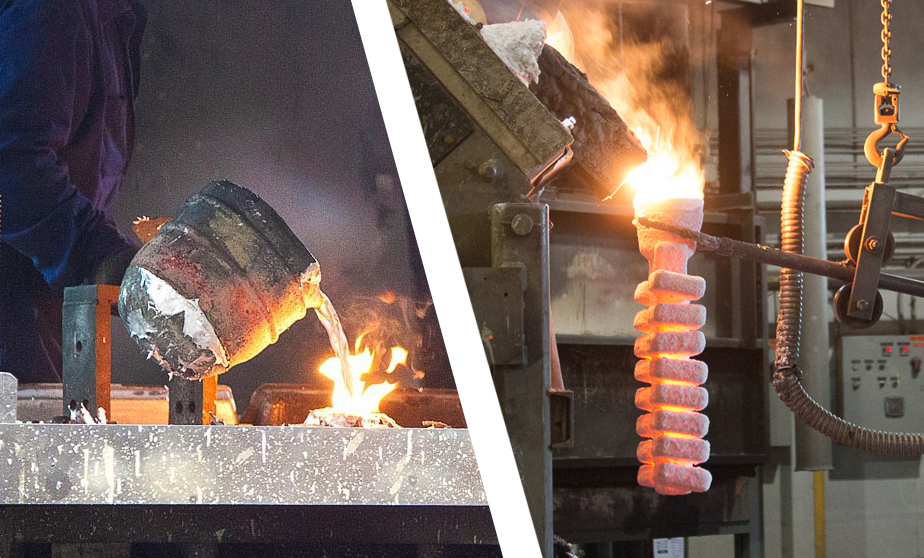The Only Guide to Stahl Specialty Company
The Only Guide to Stahl Specialty Company
Blog Article
Some Known Details About Stahl Specialty Company
Table of ContentsThe Stahl Specialty Company StatementsStahl Specialty Company Can Be Fun For AnyoneSome Of Stahl Specialty CompanySome Known Incorrect Statements About Stahl Specialty Company How Stahl Specialty Company can Save You Time, Stress, and Money.
The subtle difference depends on the chemical content. Chemical Contrast of Cast Light weight aluminum Alloys Silicon advertises castability by reducing the alloy's melting temperature and improving fluidness throughout casting. It plays a vital duty in permitting elaborate mold and mildews to be filled accurately. Additionally, silicon contributes to the alloy's strength and wear resistance, making it valuable in applications where longevity is crucial, such as automotive components and engine elements.It additionally boosts the machinability of the alloy, making it much easier to refine into finished items. This way, iron adds to the total workability of light weight aluminum alloys. Copper boosts electric conductivity, making it helpful in electric applications. It likewise improves rust resistance and contributes to the alloy's overall strength.
Manganese contributes to the strength of light weight aluminum alloys and boosts workability. Magnesium is a lightweight element that provides toughness and influence resistance to aluminum alloys.
It enables the manufacturing of light-weight elements with excellent mechanical residential properties. Zinc improves the castability of aluminum alloys and aids regulate the solidification process throughout spreading. It improves the alloy's stamina and hardness. It is typically located in applications where complex forms and great details are needed, such as attractive spreadings and certain automobile parts.
Stahl Specialty Company for Beginners
Since aluminum-silicon alloys have great spreading residential properties, high gas buildings, easy procedures, and superb rust resistance, aluminum-silicon alloys are most generally used in the die-casting industry in your home and abroad. At the exact same time, aluminum-silicon alloys are also relatively very early and extensively recognized alloys established and made use of in die-casting. After continual research study and improvement, a lot of the existing international mainstream aluminum-silicon alloys have actually been settled and are nothing even more than A356, A360, A380, ADC12, B390, and A413.
The primary thermal conductivity, tensile toughness, yield strength, and elongation differ. Amongst the above alloys, A356 has the highest possible thermal conductivity, and A380 and ADC12 have the lowest.

Our Stahl Specialty Company PDFs
In accuracy spreading, 6063 is well-suited for applications where detailed geometries and high-grade surface finishes are extremely important. Examples include telecommunication enclosures, where the alloy's remarkable formability permits for sleek and visually pleasing designs while preserving structural honesty. Similarly, in the Lights Solutions market, precision-cast 6063 elements develop stylish and efficient lighting fixtures that require complex shapes and great thermal efficiency.
(http://prsync.com/stahlspecialtycompany/)
It leads to a finer surface finish and far better deterioration resistance in A360. The A360 shows remarkable prolongation, making it optimal for complicated and thin-walled components. In accuracy casting applications, A360 is appropriate for sectors such as Customer Electronic Devices, Telecommunication, and Power Devices. aluminum foundry. Its boosted fluidness permits elaborate, high-precision components like mobile phone casings and interaction tool housings.

In accuracy site link casting, light weight aluminum 413 shines in the Customer Electronic Devices and Power Devices industries. This alloy's superior rust resistance makes it an excellent selection for outside applications, guaranteeing resilient, sturdy products in the stated sectors.
How Stahl Specialty Company can Save You Time, Stress, and Money.
The light weight aluminum alloy you choose will substantially impact both the spreading process and the residential or commercial properties of the last item. Since of this, you must make your decision carefully and take an informed strategy.
Identifying the most suitable aluminum alloy for your application will mean considering a wide array of features. The first category addresses alloy attributes that influence the production process.
The alloy you choose for die spreading straight affects several facets of the spreading process, like just how very easy the alloy is to deal with and if it is vulnerable to casting flaws. Hot breaking, additionally recognized as solidification breaking, is a common die spreading defect for aluminum alloys that can lead to internal or surface-level tears or splits.
The Single Strategy To Use For Stahl Specialty Company
Particular aluminum alloys are extra vulnerable to hot splitting than others, and your option needs to consider this. Casting Foundry. It can harm both the cast and the die, so you must look for alloys with high anti-soldering properties.
Deterioration resistance, which is already a noteworthy attribute of aluminum, can vary considerably from alloy to alloy and is a vital particular to think about depending on the ecological conditions your product will certainly be exposed to. Wear resistance is another residential property commonly sought in light weight aluminum products and can distinguish some alloys.
Report this page